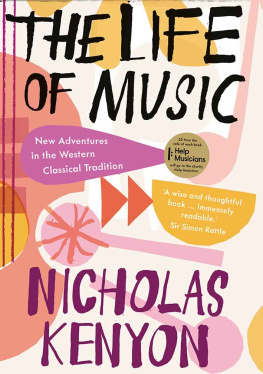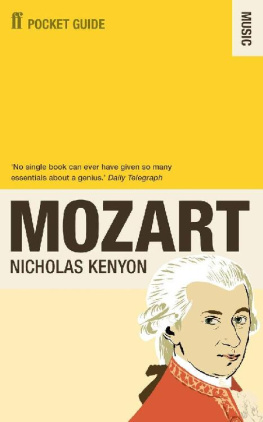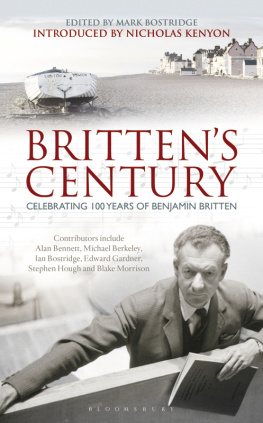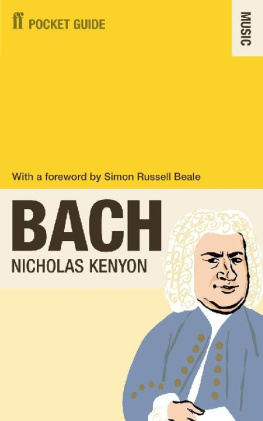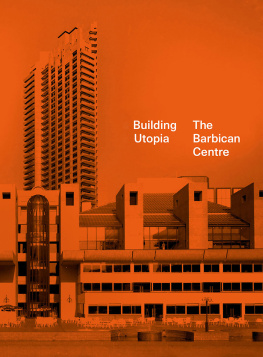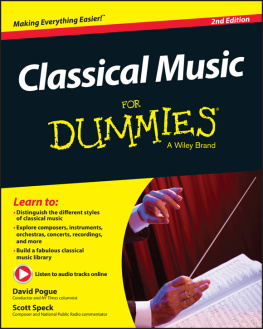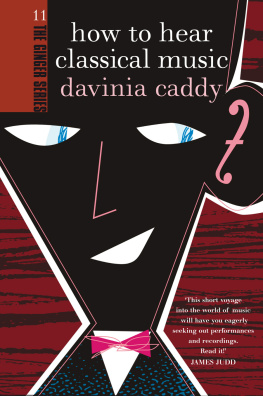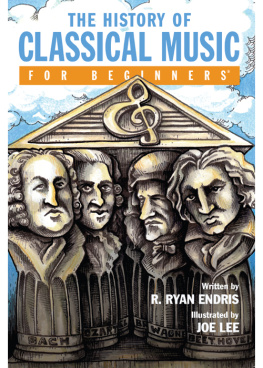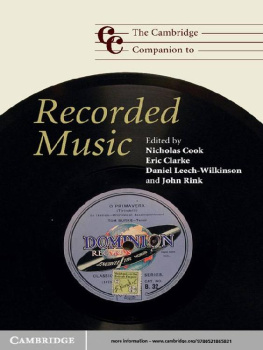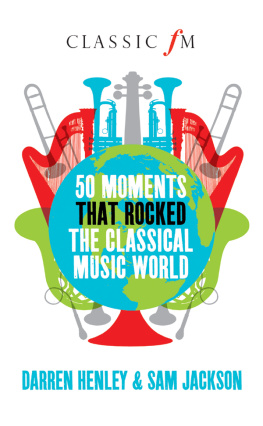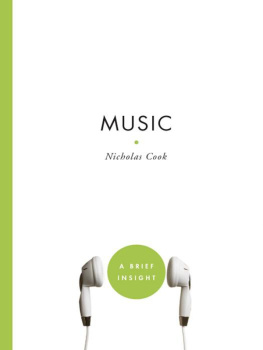Nicholas Kenyon - The Life of Music: New Adventures in the Western Classical Tradition
Here you can read online Nicholas Kenyon - The Life of Music: New Adventures in the Western Classical Tradition full text of the book (entire story) in english for free. Download pdf and epub, get meaning, cover and reviews about this ebook. year: 2021, publisher: Yale University Press, genre: Detective and thriller. Description of the work, (preface) as well as reviews are available. Best literature library LitArk.com created for fans of good reading and offers a wide selection of genres:
Romance novel
Science fiction
Adventure
Detective
Science
History
Home and family
Prose
Art
Politics
Computer
Non-fiction
Religion
Business
Children
Humor
Choose a favorite category and find really read worthwhile books. Enjoy immersion in the world of imagination, feel the emotions of the characters or learn something new for yourself, make an fascinating discovery.
- Book:The Life of Music: New Adventures in the Western Classical Tradition
- Author:
- Publisher:Yale University Press
- Genre:
- Year:2021
- Rating:5 / 5
- Favourites:Add to favourites
- Your mark:
- 100
- 1
- 2
- 3
- 4
- 5
The Life of Music: New Adventures in the Western Classical Tradition: summary, description and annotation
We offer to read an annotation, description, summary or preface (depends on what the author of the book "The Life of Music: New Adventures in the Western Classical Tradition" wrote himself). If you haven't found the necessary information about the book — write in the comments, we will try to find it.
The Life of Music: New Adventures in the Western Classical Tradition — read online for free the complete book (whole text) full work
Below is the text of the book, divided by pages. System saving the place of the last page read, allows you to conveniently read the book "The Life of Music: New Adventures in the Western Classical Tradition" online for free, without having to search again every time where you left off. Put a bookmark, and you can go to the page where you finished reading at any time.
Font size:
Interval:
Bookmark:
THE LIFE OF MUSIC

Copyright 2021 Nicholas Kenyon
All rights reserved. This book may not be reproduced in whole or in part, in any form (beyond that copying permitted by Sections 107 and 108 of the U.S. Copyright Law and except by reviewers for the public press) without written permission from the publishers.
For information about this and other Yale University Press publications, please contact:
U.S. Office:
Europe Office:
Set in Arno Pro by IDSUK (DataConnection) Ltd
Printed in Great Britain by TJ Books, Padstow, Cornwall
Library of Congress Control Number: 2021931489
ISBN 978-0-300-22382-8
A catalogue record for this book is available from the British Library.
10 9 8 7 6 5 4 3 2 1
Contents
Plates
Acknowledgements
This project has been far too long in gestation, and I thank its commissioners Malcolm Gerratt and Robert Baldock, then of Yale University Press, both for originally suggesting it and for their patience in waiting for it. The book was finally completed thanks to the vigorous encouragement of Heather McCallum, the virtuoso support of editor Rachael Lonsdale, and the skilful copy-editing of Richard Mason. Richard Abram read the proofs meticulously. Alison Giles has splendidly assembled the pictures of music in performance. Many have helped along the way with thoughts, comments and advice, including the inspiration of all the musicians across the years who brought this music to life. Although they cannot be blamed for any of the gaps and mistakes which remain, I would like to thank Sally Dunkley, Amanda Holden, Robin Baird-Smith, Richard Wigmore and especially my wife Ghislaine. Through the appalling period of Covid-19, when almost all the evenings and weekends that had been filled with planned performances and events in my full-time occupation at the Barbican suddenly evaporated, she kept me continuously nourished, stimulated and alive. It is one tiny benefit of a dreadful time that at least the book got finished.
N.K.
November 2020
Prelude in a Crisis
Before 2020, this book might have been very different. It would have celebrated the fact that music brings us together in so many diverse ways, that people gathering to make music and listen to music is one of the essential things that makes the art form live for all of us.
How the world changes in an instant! The global pandemic of 2020 turned on its head so much that we had believed about the uniting force of live music, as our survival depended on not coming together, on not gathering, and on isolating safely away from other people. Large gatherings were banned, concert halls and theatres closed, social interaction kept to a carefully controlled minimum. It was not possible for live music to fulfil its traditional function of a communal experience; instead we had to look for other ways for music to work in our lives.
During the Second World War, at a time of great peril for London, the National Gallerys pictures were removed to safety in Wales. But the music played on: the Gallery mounted concerts by the pianist Myra Hess which drew rapt, dedicated audiences whose challenged lives were for a few minutes enhanced by the music they heard. After the attacks of 9/11 in New York in 2001, concert events both large and small, amateur and professional, around the city, featuring music from Brahmss German Requiem and later John Adamss newly commissioned On the Transmigration of Souls, assisted the process of response and renewal. When the sudden death of Diana, Princess of Wales, in 1997 traumatised a nation, there were two moments of music at her funeral in Westminster Abbey that caught the public mood and united everyone in shared emotion: Elton Johns performance of his own song Candle in the Wind, and John Taveners hypnotic choral Song for Athene, its sounds reaching back across the centuries, sung as the coffin was carried out of the abbey to waiting crowds. The power of music needed no greater proof.
It seems that, no matter how great a crisis, this convening power of music helps us to deal with it. To those who have ever doubted whether the technological innovations of the last century have had a positive or negative effect on musical performance and experience a frequently heard concern among the purist creators of live music the situation in 2020 gave the immediate answer: technology became the only way for us to interact musically. Within a very short time of venues closing down in many countries, shared experiences were being created through digital exchange. Footage of opera ringing out from Italian balconies, ingenious multi-tracking of distanced individual performers recording five or six parts simultaneously, link-ups across continents of soloists and accompanists, virtual orchestras, virtual choirs, either recorded using social distancing or in individual living rooms and offices: the ability of technology to replicate the illusion of togetherness was being celebrated. That was a decisive change: whatever happens in the future, it is certain that online provision will grow in importance even when the crisis diminishes.
There were those in the past, like the pianist Glenn Gould, who loved so much the control and the isolation that the recording studio offered, that he hoped he would never have to give another public concert. Technology would triumph. This did not turn out to be the case during that period, because there was no imperative to abandon live music-making and the public continued to throng to live events. They saw recordings simply as an addition to live performance, not as a substitute for it, and the thirst for visceral experience remained strong. That story has been reinforced during limited emergence from the pandemic. Starved of live performance for too long, both audiences and artists responded strongly to the reinvention of live music-making. The experience of musicians returning from lockdown to that of playing and singing together again has been overwhelming in its intensity. In an uncertain period of recovery, we can be sure that digital delivery and digital creativity in many forms will continue to complement, rather than replace, the impact of the live gathering.
*
The narrative of this book is informed by two complementary perspectives which have changed the way we relate to music today. The first is our growing understanding that music is performance: the act of making music is what makes it live. We need to feel the experience across time of hearing music, performing music and receiving it in the court or the countryside, the coffee house or the concert hall. The time when music was thought to be essentially notes on a page was a limited period in history. The second point is specific to our age: that through technology, because all music is now available to us instantaneously, musical history has become suddenly simultaneous. Whereas in the past the story was a continuous line of development, from the past through the present to the future, now the instant availability of everything allows us to dip in anywhere, to pick and mix. And because all music is there at the flick of a switch or the click of a mouse button, the story is no longer a simple tale of progress. Our engagement with music today is far from linear, and the new adventures of the classical tradition consist of exploring that new non-linear experience. Across the timeline of Western music there are, however, still moments which mark a seismic shift in musical style, which change the way we hear the world. I call these tipping points, because they face both backwards and forwards, growing out of old practice towards new practice. Those very terms
Next pageFont size:
Interval:
Bookmark:
Similar books «The Life of Music: New Adventures in the Western Classical Tradition»
Look at similar books to The Life of Music: New Adventures in the Western Classical Tradition. We have selected literature similar in name and meaning in the hope of providing readers with more options to find new, interesting, not yet read works.
Discussion, reviews of the book The Life of Music: New Adventures in the Western Classical Tradition and just readers' own opinions. Leave your comments, write what you think about the work, its meaning or the main characters. Specify what exactly you liked and what you didn't like, and why you think so.

